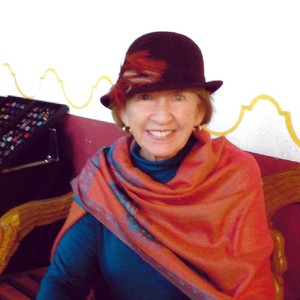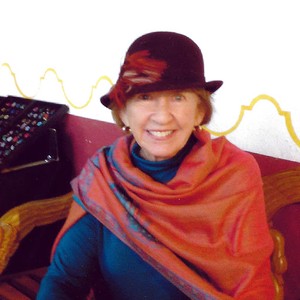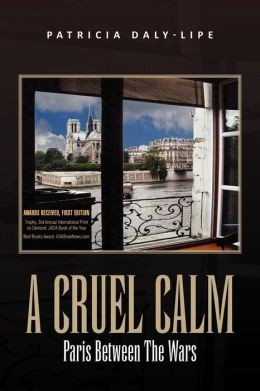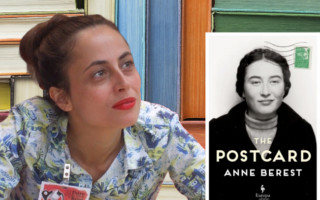A Cruel Calm: Paris Between The Wars (A Book by Patricia Daly-Lipe)

- SUBSCRIBE
- ALREADY SUBSCRIBED?
BECOME A BONJOUR PARIS MEMBER
Gain full access to our collection of over 5,000 articles and bring the City of Light into your life. Just 60 USD per year.
Find out why you should become a member here.
Sign in
Fill in your credentials below.
 Who hasn’t wondered about the lives our parents lived before we came along? Often the details are elusive. Patricia Daly–Lipe spent 15 years researching her mother’s early life and writing her latest book, A Cruel Calm: Paris Between The Wars. Written as historical fiction set in the context of the era, it tells of change and love in the city that made it possible. And what a read it is!
Who hasn’t wondered about the lives our parents lived before we came along? Often the details are elusive. Patricia Daly–Lipe spent 15 years researching her mother’s early life and writing her latest book, A Cruel Calm: Paris Between The Wars. Written as historical fiction set in the context of the era, it tells of change and love in the city that made it possible. And what a read it is!
Our heroine is Elisabeth Perry, known as Libby. She was adored and indulged, but hardly prepared for what life would bring her way. A privileged but sheltered Catholic girlhood in Washington had groomed her for her expected role, to make a “good” marriage and exhibit the womanly virtues of “piety, submissiveness and domesticity.”
Toward that end, she was presented to society, as was the custom. Her season was a success; at its completion, she had received a proposal of marriage from the most eligible of all the young bachelors in attendance. Libby accepted and they married. In her mind, marriage represented independence and access to secrets her stylish, distant mother would never discuss. Michael Whitacker was a handsome man with a taste for adventure and, lately, a passion for aviation. He would pursue that passion in Paris.
Paris between the wars was the center of innovation and culture, of ideas that had never before been voiced. Hope and creativity reigned, and yet, trouble was brewing. Scarcely a generation after the Great War ended, we would learn it was not the war to end all wars. For Libby at the time, despite nagging misgivings (mostly about her marriage), life was good in Paris.
It was a world where a young woman could attend dinners hosted by Gertrude Stein or Natalie Barney and swap ideas with Djuna Barnes or Virginia Woolf. In Libby’s Paris, her reading list was compiled by Sylvia Beach, and she enjoyed the kindness and sage advice of Miss Beach’s friend, her own neighbor, James Joyce. The book is liberally seasoned with the key players of the time, whose dialogue and activity are documented. Life was good until a shocking discovery turned life upside down and caused her to question everything she believed. It also marked a beginning.
 France led the world in aviation at the time, and it is fittingly woven into the narrative. When a young American made aviation history, Libby stood in the crowd at Le Bourget, French and Americans alike, screaming “Lindy! Lindy!” long before his wheels touched the tarmac. It was there that Libby met the man who would be her heart’s true love. She fell passionately and profoundly in love with another aviator, a titled Frenchman named Philippe, and he with her. Although she was still married to Michael, they began an affair. The debutante who had found the behavior of flappers shocking (while secretly envying them their freedom) had traveled far.
France led the world in aviation at the time, and it is fittingly woven into the narrative. When a young American made aviation history, Libby stood in the crowd at Le Bourget, French and Americans alike, screaming “Lindy! Lindy!” long before his wheels touched the tarmac. It was there that Libby met the man who would be her heart’s true love. She fell passionately and profoundly in love with another aviator, a titled Frenchman named Philippe, and he with her. Although she was still married to Michael, they began an affair. The debutante who had found the behavior of flappers shocking (while secretly envying them their freedom) had traveled far.
Libby tried to live according to her conscience, but her beloved Church, once her comfort, became an obstacle to her happiness. Even with Michael’s acquiescence and his admission of an impediment to the marriage, the Church denied an annulment. (I must confess I had long assumed an unconsummated marriage was sufficient grounds.) Our generation has seen numerous prominent men secure annulments and change partners as easily as they change their linen; it is hard to imagine the Church was once so conservative in that respect.
In 1933, two events occurred that would change the world. Adolf Hitler was appointed Chancellor of Germany, and Franklin D. Roosevelt was sworn in as President of the United States. Rumors of war began to circulate almost immediately. Another event would change only the lives of two young lovers. Libby left Paris, having finally made the decision to embark on what her mother referred to as “this brash venture” – the dissolution of her marriage. She would be free in the eyes of the law, if not those of the Church
Libby does return to Paris and to Philippe, but Paris is changing, as is she. The accounts of France mobilizing for war will be particularly poignant to anyone who loves that country. Nor can one remain unmoved, picturing young boys putting on a brave face as they head off to war, bearing firearms with blossoms stuck in their barrels – la fleur au fusil. As France prepared for war, Americans left. In 1939, Libby boarded the luxurious PanAm Dixie Clipper bound for New York.
The next year, France fell.
As the gulf had widened between Libby Perry and the Church that had been her rock, she found God in nature, in watching the men who fished along a sun-dappled Seine and in purple mountains set against a Nevada sunrise. Thus, she found herself. I think you’ll enjoy reading of her journey. It is a daughter’s beautiful tribute to her mother.
Jane del Monte lived for a number of years in Paris. She is the owner of ARTS in PARIS, personalized tours that focus on French culture and l’art de vivre. The next tour, Impressions of Paris 2014, will take place in May.
More in book review, new book, Paris book reviews, Paris books


